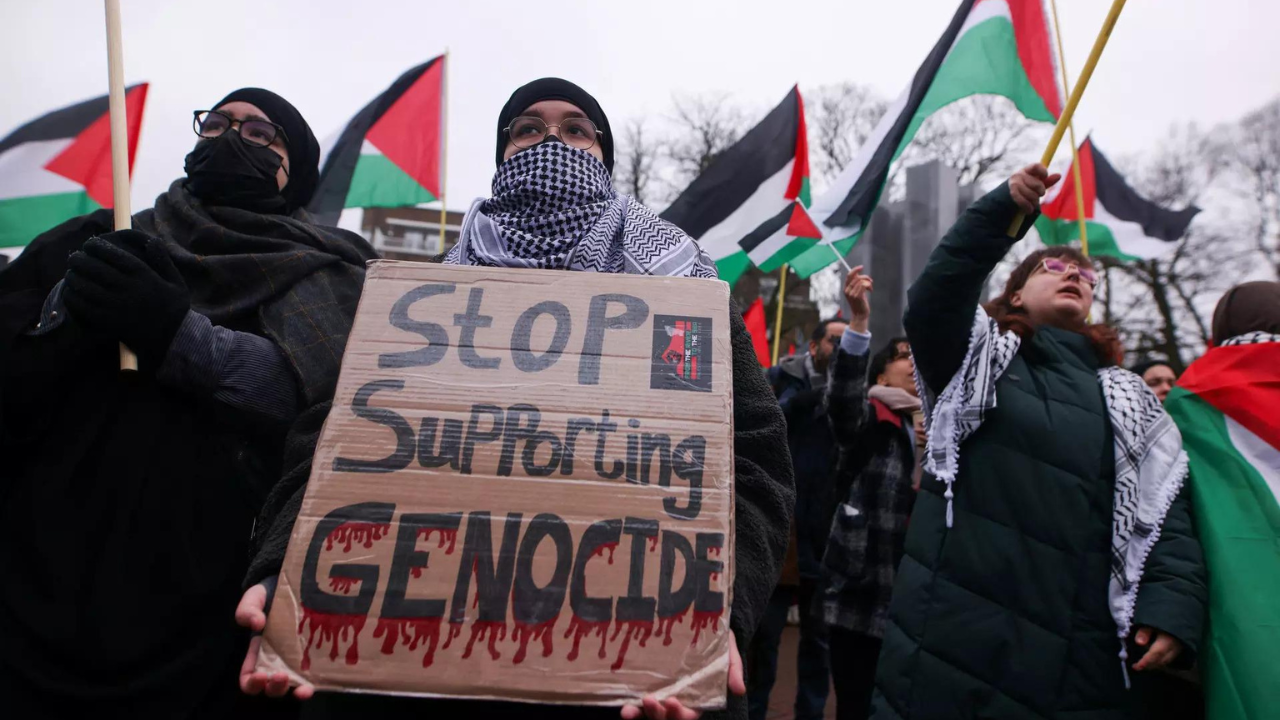DUBLIN: Over the past few days, South Africa has made its case at the International Court of Justice in The Hague, accusing the Israeli government of committing genocide with its 100-day assault on Gaza.
With the death toll approaching 24,000 in the Palestinian territory, South Africa’s lawyers laid out the grounds on which they are accusing Israel of breaching the 1948 Genocide Convention, while Israel’s legal team have presented their counter- arguments.
South Africa’s case is essentially that Israel’s assault is “intended to bring about the destruction of a substantial part of the Palestinian national, racial and ethnical group, that being the part of the Palestinian group in the Gaza Strip”. Israel in turn has denied this, arguing that it has been exercising its fundamental right to self-defence under international law.
The UN’s genocide convention was adopted by the General Assembly on December 9 1948. It was the first human rights treaty to respond to the systematic atrocities committed by the Nazi regime during the second world war.
It was a Polish Jew, Raphael Lemkin, who first coined the term “genocide”. Lemkin was a lawyer who fled to the US in 1939 after Germany invaded his country. He combined two words: the Greek genos (race or tribe) and the Latin cide (from caedere, meaning: to kill).
According to Article 2 of the 1948 Convention, the main feature of the ultimate crime against humanity is twofold.
One, genocide victims are always “passive targets”. They have been singled out for their membership of a national, ethnic, racial or religious group rather than for anything they have done. And, two, the crime also establishes a “specific intent” to destroy, in whole or in part, that group.
The nexus between the two provisions is the Convention’s backbone. It marks legal boundaries that set genocide apart from other crimes against humanity. While high death tolls often rightly bring international condemnation, as a legal category, genocide is not contingent upon the number of civilian casualties that may ensue from a state’s disproportionate use of military force.
South Africa’s lawyers have gone to great lengths to prove genocidal intent. They backed this assertion by quoting some of the more incendiary statements by the far-right members of the Israeli government. On November 2023, Israel’s heritage minister, Amichai Eliyahu, claimed that there was no such thing as non-combatants in Gaza and that dropping a nuclear weapon there was an “option”.
Eliyahu is not a member of Israel’s three-person war cabinet. But South Africa’s application reported other controversial statements from those senior leaders as well.
Soon after the October 7 attacks, the defence minister, Yoav Gallant, argued that a complete blockade on Gaza City – preventing water, food, gas or medical supplies from reaching civilians – was a legitimate tactic of warfare.
Israel’s president, Isaac Herzog, said everyone in Gaza was complicit in Hamas’s terror attack on October 7: “It is an entire nation out there that is responsible.”
Israeli prime minister, Benjamin Netanyahu, meanwhile, dropped heavy hints with repeated references to Bible history when he invoked references to God’s exhortation to Israel to deal harshly with one of its enemies, to “blot out the remembrance of Amalek from under heaven”.
The Israeli legal team presented a robust rebuttal. They maintained that the Israel Defense Forces campaign in Gaza was justified by the inalienable right of self-defence. Because of this, it was within the stringent parameters of international humanitarian law.
It had been Hamas, they suggested, that had maliciously endangered Palestinian lives by shielding its military wing inside residential areas while launching attacks from schools, mosques, hospitals and UN facilities.
Opening for Israel, Tal Becker, legal adviser of the ministry of foreign affairs, argued that South Africa was “asking the UN court to substitute the lens of an armed conflict between a state and a lawless terrorist organisation with the lens of a so-called ‘genocide’ of a state against a civilian population”. In so doing, South Africa was not providing the ICJ with a lens but a “blindfold”.
Becker read descriptive excerpts from a video compiled by the Israeli government describing some of the alleged atrocities committed during Hamas’s October 7 assault into Israel. He also showed an interview with senior Hamas leader Ghazi Hamad, speaking on Lebanese TV on October 24, in which he appeared to assert that Hamas aimed at the complete annihilation of Israel.
Hamad said: “We must teach Israel a lesson, and we will do it twice and three times. The Al-Aqsa Deluge [the name Hamas gave its October 7 onslaught] is just the first time, and there will be a second, a third, a fourth.”
This was offered as proof that, contrary to South Africa’s case, it was Hamas that harboured genocidal intent towards Israelis.
Whatever the court’s final determinations might be, the accusation levelled against Israel constitutes a historical watershed with profound symbolic ramifications.
Palestinians have traditionally sought legitimacy and recognition by trying to embed their national aspirations and rights in the lexicon of international law. Now, they may feel some catharsis at the sight of Israeli representatives being compelled, for the first time, to defend their country’s conduct of war before a panel of UN judges.
Within Israel’s collective psyche, the recent ICJ proceedings represent an unsettling reversal of history. The crime of genocide has now been invoked against Israel – a state established in the same year as the UN Convention and with its same rationale: protecting the Jewish people from future persecution and destruction.
Without proven intent, the South African application may be, as the US secretary of state Antony Blinken has insisted, “meritless” from a legal standpoint. But that reversal alone might retain enough symbolic clout to infer a decisive blow to Israel’s international status.
With the death toll approaching 24,000 in the Palestinian territory, South Africa’s lawyers laid out the grounds on which they are accusing Israel of breaching the 1948 Genocide Convention, while Israel’s legal team have presented their counter- arguments.
South Africa’s case is essentially that Israel’s assault is “intended to bring about the destruction of a substantial part of the Palestinian national, racial and ethnical group, that being the part of the Palestinian group in the Gaza Strip”. Israel in turn has denied this, arguing that it has been exercising its fundamental right to self-defence under international law.
The UN’s genocide convention was adopted by the General Assembly on December 9 1948. It was the first human rights treaty to respond to the systematic atrocities committed by the Nazi regime during the second world war.
It was a Polish Jew, Raphael Lemkin, who first coined the term “genocide”. Lemkin was a lawyer who fled to the US in 1939 after Germany invaded his country. He combined two words: the Greek genos (race or tribe) and the Latin cide (from caedere, meaning: to kill).
According to Article 2 of the 1948 Convention, the main feature of the ultimate crime against humanity is twofold.
One, genocide victims are always “passive targets”. They have been singled out for their membership of a national, ethnic, racial or religious group rather than for anything they have done. And, two, the crime also establishes a “specific intent” to destroy, in whole or in part, that group.
The nexus between the two provisions is the Convention’s backbone. It marks legal boundaries that set genocide apart from other crimes against humanity. While high death tolls often rightly bring international condemnation, as a legal category, genocide is not contingent upon the number of civilian casualties that may ensue from a state’s disproportionate use of military force.
South Africa’s lawyers have gone to great lengths to prove genocidal intent. They backed this assertion by quoting some of the more incendiary statements by the far-right members of the Israeli government. On November 2023, Israel’s heritage minister, Amichai Eliyahu, claimed that there was no such thing as non-combatants in Gaza and that dropping a nuclear weapon there was an “option”.
Eliyahu is not a member of Israel’s three-person war cabinet. But South Africa’s application reported other controversial statements from those senior leaders as well.
Soon after the October 7 attacks, the defence minister, Yoav Gallant, argued that a complete blockade on Gaza City – preventing water, food, gas or medical supplies from reaching civilians – was a legitimate tactic of warfare.
Israel’s president, Isaac Herzog, said everyone in Gaza was complicit in Hamas’s terror attack on October 7: “It is an entire nation out there that is responsible.”
Israeli prime minister, Benjamin Netanyahu, meanwhile, dropped heavy hints with repeated references to Bible history when he invoked references to God’s exhortation to Israel to deal harshly with one of its enemies, to “blot out the remembrance of Amalek from under heaven”.
The Israeli legal team presented a robust rebuttal. They maintained that the Israel Defense Forces campaign in Gaza was justified by the inalienable right of self-defence. Because of this, it was within the stringent parameters of international humanitarian law.
It had been Hamas, they suggested, that had maliciously endangered Palestinian lives by shielding its military wing inside residential areas while launching attacks from schools, mosques, hospitals and UN facilities.
Opening for Israel, Tal Becker, legal adviser of the ministry of foreign affairs, argued that South Africa was “asking the UN court to substitute the lens of an armed conflict between a state and a lawless terrorist organisation with the lens of a so-called ‘genocide’ of a state against a civilian population”. In so doing, South Africa was not providing the ICJ with a lens but a “blindfold”.
Becker read descriptive excerpts from a video compiled by the Israeli government describing some of the alleged atrocities committed during Hamas’s October 7 assault into Israel. He also showed an interview with senior Hamas leader Ghazi Hamad, speaking on Lebanese TV on October 24, in which he appeared to assert that Hamas aimed at the complete annihilation of Israel.
Hamad said: “We must teach Israel a lesson, and we will do it twice and three times. The Al-Aqsa Deluge [the name Hamas gave its October 7 onslaught] is just the first time, and there will be a second, a third, a fourth.”
This was offered as proof that, contrary to South Africa’s case, it was Hamas that harboured genocidal intent towards Israelis.
Whatever the court’s final determinations might be, the accusation levelled against Israel constitutes a historical watershed with profound symbolic ramifications.
Palestinians have traditionally sought legitimacy and recognition by trying to embed their national aspirations and rights in the lexicon of international law. Now, they may feel some catharsis at the sight of Israeli representatives being compelled, for the first time, to defend their country’s conduct of war before a panel of UN judges.
Within Israel’s collective psyche, the recent ICJ proceedings represent an unsettling reversal of history. The crime of genocide has now been invoked against Israel – a state established in the same year as the UN Convention and with its same rationale: protecting the Jewish people from future persecution and destruction.
Without proven intent, the South African application may be, as the US secretary of state Antony Blinken has insisted, “meritless” from a legal standpoint. But that reversal alone might retain enough symbolic clout to infer a decisive blow to Israel’s international status.
Credit: Source link


